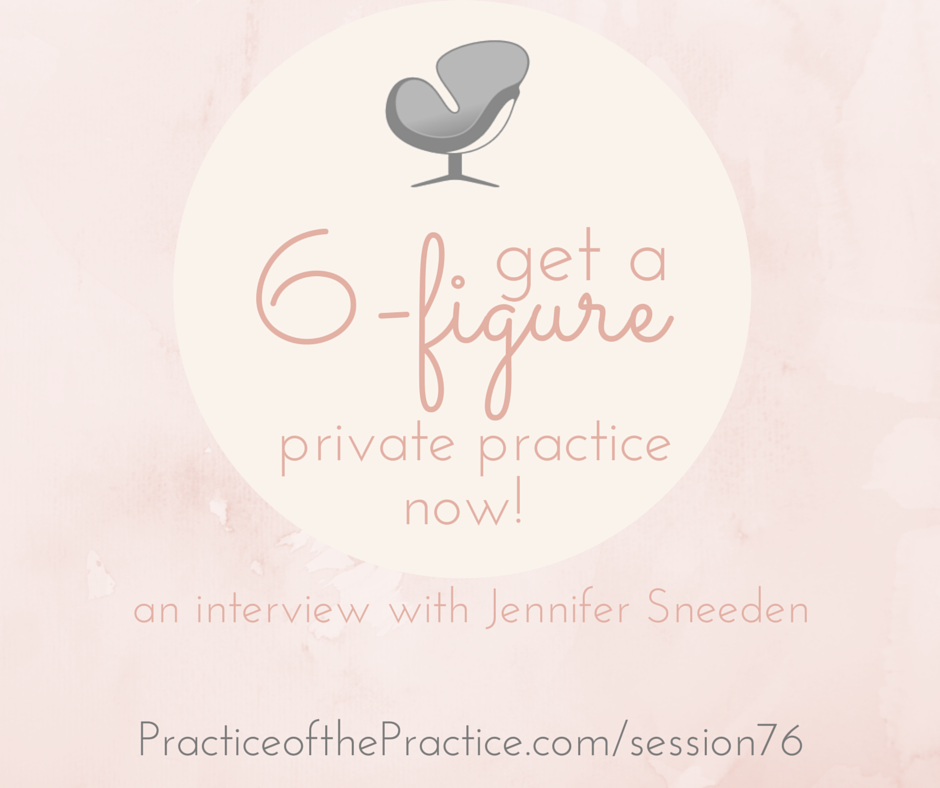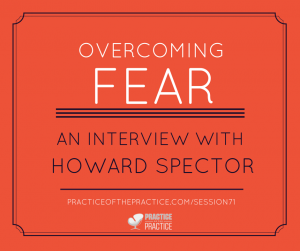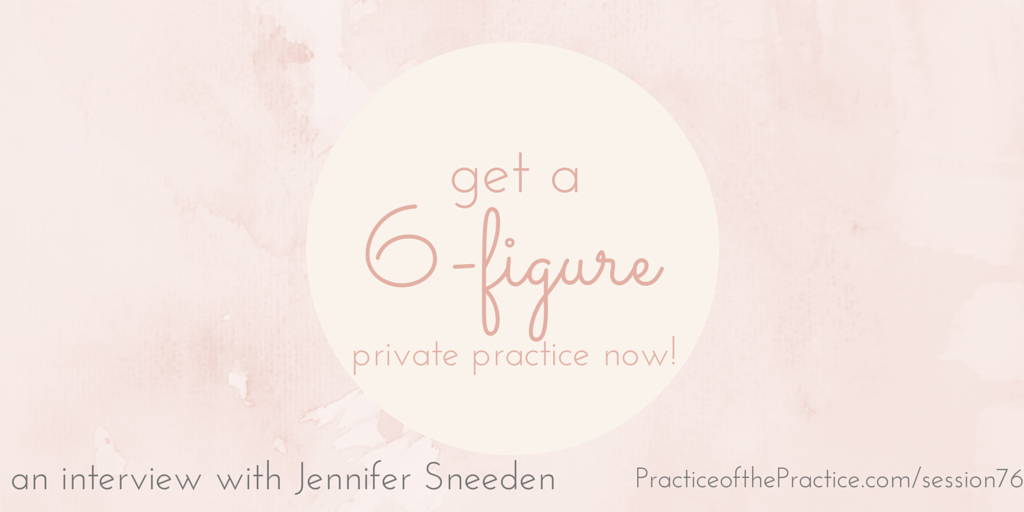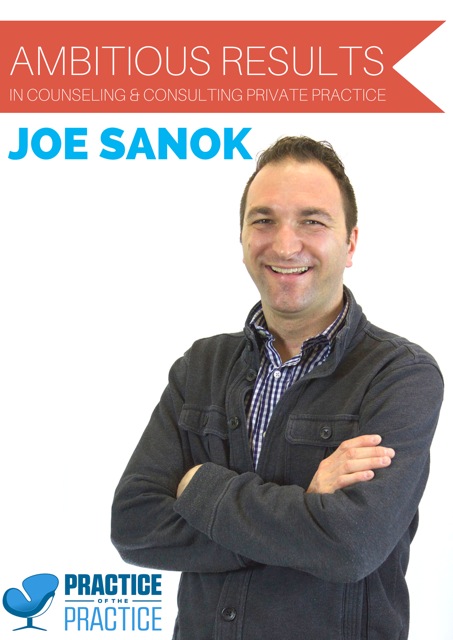Podcast: Play in new window | Download | Embed
AWEBER, MAKE EMAIL EASIER
TRY IT FOR $1
Today’s Private Practice Podcast Resource
What you will discover in this podcast
3:57 What Jennifer did when she thought she wanted to quit counseling.
4:17 Why anyone can make a 6-figure salary in a private practice.
8:13 How to find affluent clients anywhere!
14:24 How to learn to talk to people so they will buy.
20:05 What every counselor must know!
PoP Culture Meet Jennifer Sneeden
I met Jennifer at the 2015 ACA conference. She had a booth and was constantly busy talkign with people about how to grow a practice. I loved interviewing her because:
- She knows exactly how to build a 6-figure practice.
- She’s engaging and easy to talk to
- She’s doing similar work to me and “gets it.”
After getting her Masters in Marriage and Family Therapy, Jennifer couldn’t wait to start her own practice! At first she was frustrated: she spent a lot of time and money on her education.
However, before grad school, Jennifer spent 10 years working as a consultant. During this time she learned so much about what does and doesn’t work to build and market a business. Jennifer began to apply what she knew about running a successful consulting business to my own private practice.
Podcasts you may have missed
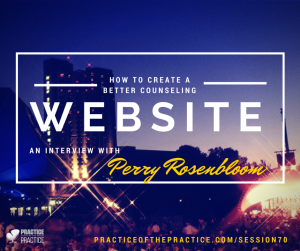
Music From The Podcast
Silence is Sexy
Bellevue
For your social media
Joseph R. Sanok, MA, LLP, LPC, NCC
Joe Sanok is an ambitious results expert. He is a private practice business consultant and counselor that helps small businesses and counselors in private practice to increase revenue and have more fun! He helps owners with website design, vision, growth, and using their time to create income through being a private practice consultant.
Joe was frustrated with his lack of business and marketing skills when he left graduate school. He loved helping people through counseling, but felt that often people couldn’t find him. Over the past few years he has grown his skills, income, and ability to lead others, while still maintaining an active private practice in Traverse City, MI.
To link to Joe’s Google+ .
Here is the Transcription of This Podcast
Get a 6-Figure Practice Now An interview with Jennifer Sneeden
This is the Practice of the Practice Podcast with Joe Sanok, Session 76. I’m Joe Sanok, your host. Welcome to the Practice of the Practice Podcast. Man, I just love doing this podcast, and it’s just really exciting. So, today’s resource that I’m going to tell you about is The Most Awesome Conference. I know a lot of you have heard about this, but we had some people sign up from the podcast from last week, and I just want you to join me in southern California, May 28 through 30th. Help celebrate my daughter’s birthday there.
It’s going to be four private practice consultants as well as a bunch of other people that are helping out with this conference. You can go mostawesomeconference.com/about and if you sign up, I am just right now this week decided that I’m going to add you if you want to to the members’ newsletter. So, the lifetime membership for that right now is $550 to have a lifetime membership on that or it’s $190 a year. So, that’s an extra add-on that I’m going to do. Just use promo code joe, all lower case, J-O-E. You get $225 off and then just email me your receipt to show that you’re signing up or just email me and let me know and I will add you to the members’ newsletter and you’ll be on there forever. So, you’ll save that 225 bucks plus the $550.
Hey, conference is almost free!
Well, today, I am so excited about Jennifer Sneeden. Jennifer has the website, thrivingtherapypractice.com. She has so many great resources about being on track to have a six-figure private practice and man, if you just look at like her blog posts on her website, let me just like read some of the titles here: Stopping at the Start, Identifying Mental Barriers to Success, The Seven Lies Therapists Tell Themselves that Keep Them Struggling, Broke and Overwhelmed, Really Understanding Your Ideal Client, Are You Costing Yourself Clients, The Best Social Media for Therapists. I mean, she has so many great blog posts. As well, she has a ton of events, of books, of just — I mean, like this lady it’s just amazing.
I’m clicking through her website and let me just look at her profile and just tell you just a little bit about her. She’s been doing building a thriving therapy practice, workshops for a long time and Jennifer is just she’s on her master’s in marriage and family therapy but really she’s doing so much consulting on how to run a six-figure business. I’m not going to take anything away from her. I want you to hear from her, and then I’ll tell you more about her books and stuff at the end. But Jennifer Sneeden is just amazing. And I really enjoyed getting to know her at the ACA conference.
Joe Sanok: So, I give you, Jennifer. Jennifer Sneeden, welcome to the Practice of the Practice Podcast.
JS: Thank you. It’s really such an honor to be here. I’m so happy to do this.
Joe Sanok: Yeah, yeah. Well, your book is like such a high-ranking Amazon book and you’re teaching people about how to grow their private practices, but before we get into all that, tell us a little bit about your story. Like how did you get into consulting in private practice?
JS: Sure. Well, I — first out of grad school, I worked in organizational consulting and I loved it but it was living on the road, living on the road, living on road and I reached a point at which I was just done with that. I went into private practice and I was a disaster. I did everything wrong that could possibly be done wrong and I got to the point where I just really thought I had to give it up and go back to consulting.
What Jennifer did when she thought she wanted to quit counseling
And it was actually my husband who said, “Stick with this. We can figure it out.” And I did and it took me about four years to get my act together. I made every mistake you could make, but once I figured it out I realized, “Wow! This is so cool it’s a lot of fun.”
Why anyone can make a 6-figure salary in a private practice
I knew, if I could make a six-figure practice in private practice, anybody can do it. And so I thought, let me reach out and help people that are struggling that want to be able to do it and share with them what I learned along the way.
Joe Sanok: It’s so funny like I just interviewed Evan and she was talking about how like her private practice was a disaster. Miranda and Kelly are like, “Yeah, my private practice was kind of a disaster.” It’s like the common thread between consultants like screw it up and then figure out what went wrong and then teach other people how to do it.
JS: Well, and you know, it’s a great point because I think the common thread is, it is a disaster in the beginning. And you can’t give up on yourself and I know a lot of people that have started, they had that disaster phase and then they left the field. They went to work for an agency, they went teach, but they gave up on their dream, and I think really, that what’s common across the theme is, don’t give up on it because that’s an evolutionary process.
Joe Sanok: Yes. So, when you were in that disaster phase of your private practice, when did some light bulbs like start to go off like, “Oh, I could do this or this.” Like what did you start to learn through that experience?
JS: Well, I know this is going to be really controversial, but the biggest thing I learned is that I could not take insurance, because the reimbursement range were so low and the no-show rates were so high that the practice just wasn’t working. What made a big difference for me was when I decided I was not going to accept insurance anymore and I just had as of May 31, I’m done. I’m not doing it anymore, and it was probably the scariest thing I’ve ever done in my life. And I lost a lot of clients, I lost a lot of clients but I made more money and it was like, “Holy cow! What was I doing all this time?”
Joe Sanok: Well, you’re amongst friends. I have a private pay private practice. Lots of the listeners are interested in growing that so you’re amongst friends.
JS: Yes. So, it was really that leap of I can’t make this work and accept insurance at the same time.
Joe Sanok: Yes. So, was it just that you were running the numbers or you saw how much time you were spending getting reimbursed or what made that click for you?
JS: I was reading a book. My average reimbursement rate at that was I think it was about $42, $43 and I was reading a book. I practice Boca Raton, Florida. And it was a book about marketing to stay affluent, and in that book was a statement that said, “If you don’t understand the incredible amount of money that flows in this country, go spend a week in Boca Raton, Florida because the only thing they do is move money.” It was such a transformative moment because I thought, “Here I am in one of the most affluent cities in the country and I’m making $42 an hour. No more. And as of that moment I was just done. And I said, “Either I’m going to do a private pay or I’m not going to do it.”
Joe Sanok: That’s great. So, when you decided to start marketing to the affluent, then so that light bulb goes off, you’re off insurances, then what happened?
JS: So, the biggest thing that I did was raise my rates to what at that time was, I think of that time that was the highest. I know when I posed my practice, I was definitely the highest in my area. And you know, it seems so counterintuitive but you attract the client that you market to. And when I was charging $200 an hour, I was attracting those clients. I started connecting in through charity events with affluent clients. I started working with different groups that catered to the affluent client and partnering with day spas, partnering with golf clubs, partnering with private schools, places that my clients already were, and it just made really nice connections for me that way.
Joe Sanok: So does a private practice partner with a golf club?
How to find affluent clients anywhere!
JS: Oh, so this was — so where I am and I just want to say that any — regardless of where you live, there affluent clients. So, you don’t have to live in Boca to cater to the affluent because you know, a private practice needs what? Thirty clients a year and that’s fine. So, every city has 30 affluent families at least.
What I did with the golf clubs is I offered workshops for them. For the families, I offered some parenting stuff, I did — I’m trying to remember. This was six or seven years ago that I was really active with that. What really was the most successful for me of those was partnering with the day spas, because the day spa was really my client. And they’re already used to paying cash, they’re already used to spending money on themselves, and I would partner with the day spas doing what I call the evening escapes and I would go for two hours. They would invite their VIP clients. I would do a mindfulness meditation. We’d have just a really relaxing evening and they would — I would get to connect with all those new clients, and they would have a really special service to offer them.
Joe Sanok: Wow!
JS: So, that’s the one that really kind of set me on the path.
Joe Sanok: I’ve a counselor in my private practice that focuses on wellness nutrition, and I think that kind of thing would partner really well with her in kind of her niche, she’s growing.
JS: Yes.
Joe Sanok: That’s a great idea.
JS: Yeah. The other thing that I did that really helped me build that was I set up a luncheon and this was advised – this was the advice I got that I was sure was dumb advice but I tried it anyway. Just once a month, I set up a group really an informal marketing group. It was the day spa owner. It was somebody from a golf club that was an interior designer and attorney — everybody in different industries all catering to the affluent. We all got together once a month and just really kind of talked about what was happening and that turned into a great source of referrals, too. There was a financial adviser on there, a wealth management attorney and you know, we just needed people that we knew that we could refer to. That was another really great way that I got that cash practice going.
Joe Sanok: So it seems like that mindset shift of like how do I start to cater all my services towards the affluent really helped you start to grow quickly.
JS: It helped tremendously. I had to get a new office, I had to dress better when I saw clients. It really had to be a really significant shift, the whole thing. And that’s what opened up my practice.
Joe Sanok: Now, when you say dress better like what do you think an affluent client expects versus just your average client?
JS: Well, that’s you know, that’s a really good question because one of the things I talk with my clients now a lot about is, what is the image that you are presenting and are your nails done? Are you wearing nice jewelry? Are you wearing nice shoes? It doesn’t have to be that you have to fit a cookie cutter mold, but you have to project the image that you want to, that you want to project. And we don’t, oftentimes, in our profession, we want to have that, “Hey, I’m really down to earth”, but that’s not going to resonate for everybody and you have to look at yourself through your clients’ eyes.
Joe Sanok : Sure, sure. So, take me through some of the principles in the book. You have a written a book. It’s called, Building a Six-Figure Private Practice and it’s been very successful. So tell me about this book, tell me about some of the principles, some of the success of it.
JS: Okay. So, the book is what I call the magic formula for success because I believe if you can get all of these elements in your practice, you’re going to make it, and I also believe if you’re missing even one of them, you’re going to be in trouble. And the four elements are: having a vision, being really clear about who you serve and what you’re intending to do, how you help them, having the right mindset because where I think many people go wrong is they set up their own road blocks, and they just don’t have the right mindset piece, the having the right skills. So now that you’re got the vision, you’ve got the mindset, you have to know what to do, and they don’t teach you that in graduate school. You have to learn that either the school of hard knocks or you’ve got to find somebody like you, somebody like me that can offer that.
And then the last piece of it is the implementation. Do you have the systems in place to support your business? You know, can you — do you have an email list, do you have a website, is that piece you know, do you have a social media strategy? Do you have all those pieces in place?
So those are the four elements that I believe it takes to make a six-figure practice and really what I’m going through in the book is how to make sure that you have each of those elements working the way it needs to.
Joe Sanok: Wow! So, what’s a couple of quick tips to people that are just starting this journey could take away, that they could maybe start to implement today or this week?
JS: That’s a great question. So, the first thing is commit that you’re going to do it. It can’t be, “I hope I figure this out.” It has to that you are full on, 100% committed that you’re going to make this work no matter what, because as we talked about, otherwise, I don’t think you’re going to get through the disaster phase, so, having that real clarity of commitment.
And the next thing, I think for many people their biggest problem is they’re invisible. They’re excellent clinicians, and nobody know who they are. So, you can’t build a private practice behind your computer. I think that’s an important piece of it, but get out of your office. Commit to go meet people. Find out who’s in your neighborhood, what they’re offering, how you can help them. And if you do nothing else but commit to get out of your office and go meet people, I think that would be enough to start the path.
Joe Sanok: Yeah, I think that’s so true. I mean, I think about when I started in Traverse City, I moved my practice there, and I got on the radio right away. I’m still on the radio on a different form. I’m writing for the newspaper. It’s like the more you meet people and get your name off there, it’s just people go to you right away because they’re heard you. They’ve built that relationship with you before they ever met you.
JS: Absolutely. And could you imagine being a successful as you are now, if you had just like hoped people would find you online or a directory or something like that?
Joe Sanok: It’s so interesting that you know, we could teach people these basic skills of how do you develop relationships or friendships and you know, if someone is socially isolated, what would we suggest to them, it’d be the same we probably say to most clinicians about how do you grow a practice.
JS: Yup.
Joe Sanok: Go talk to people.
How to learn to talk to people so they will buy
JS: Yes, that’s right. And you know, I would even take it a step further and say, “If you don’t know how to go talk to people you can learn.” Right? That’s a skill that you can learn. If you’re not willing to go talk to people, really think seriously about whether private practice is for you because if you really want to be in your computer or you and client this may not be the right fit for you because you have to — you’re a business owner, you’re an entrepreneur and you’ve got to be out there doing it.
Joe Sanok: Yeah. So, I want to shift to: When did you go from, “Okay, I’ve got this thriving private practice” to “I should probably teach people some of these things?” Like there is something that probably then clicked there where you said, “I could consult” or “I could… What’s that next step? Take me through that.
JS: Right. So, once you — as I’m sure, you know, once you become successful in private practice, the first question everybody asks you, “How do you get your clients?”
Joe Sanok: Yeah.
JS: Right? And so, I would just tell people you know, this is how I got my clients and finally I thought, “I wonder if I could make any money doing this?” And so I put a workshop together and my first workshop I think, had three people and I was thrilled because I was doing this and that was almost six years ago, maybe six years that I’ve been doing it. In December, I closed my practice and decided to connect to this full-time because I realized that I was — there are many, many people that can be great counselors, great therapists. I don’t think there are a lot of people that can teach you how to be successful and do the marketing which is why the work that you’re doing is so important, too because you are offering that to people. You know, they want to serve and they don’t know how to connect with their clients. I really felt like I was at the place where that’s what I was growing into and so, as of January 1st, I’m full-time in this which is (cross-talk 16:04)
Joe Sanok: Congratulations. So, what were some of the kind of key components that helped you make that launch into full-time consulting?
JS: Honestly, it was a coach that I’m working with because I really believed that you can’t get really to a high level of success without a coach. So, I have always had a coach that I work with, and she had been suggesting it to me for a long time. She’d been saying, “You know, you can’t get to where you want to go unless you pick one path.” And I finally, finally took her advice and it was really just amazing what’s happened for me in the past few months.
I loved the practice very much and I felt very blessed to be able to do what I’m doing right now.
Joe Sanok: So, every consulting kind of has their own way. Some people have an E-course, some do just individual or combination. What do you do in your consulting?
JS: I have a combination of training programs that I offer. The training are usually very deep and specific skills so this month and every month, I do workshop. This month for instance it’s developing your online presence. And then I also offer 12-month coaching courses and that can be done either in a group or an individual format. I call those six-figure private practice because they’re for people who are seriously committed to break through the six-figure mark. I believe that that’s like the minimum threshold and that some people are ready and some people are just not quite at that point yet so I try to cater to the different levels that people are at in their practice.
Joe Sanok: Yeah, it’s fun to be in the six-figure club.
JS: It is really fun and you know what’s amazing is not only the lifestyle that it affords you but what you learn about yourself when you look back and then you say, “Wow, I did that for nothing. Look at what I’ve built.”
Joe Sanok: I’ve been posting my income online for the last two and a half years or so and so the audience has been able to kind of watch like that progression and this year was the first six-figure year and that was 10-15 hours a week working on things. It’s just like when you start to learn these concepts, you can replicate it and then if you replicate it in a smart way, it doesn’t cost more work for you.
JS: Well, that’s exactly it. You don’t work twice as hard to double your income.
Joe Sanok: Right.
JS: Very often, once you learn the concepts, you’re working fewer hours and doubling your income.
Joe Sanok: Yeah. So what are a few takeaways for people that want to start doing consulting, because I know a lot of the audience also is kind of at the point where their practice is going really well. They have different areas that they want to maybe consult. It may not be private practice but what are some tips in regards to becoming a consultant? You said, get a coach. What else do you think might be helpful?
JS: I think it’s, again, like I said with private practice getting a lot of clarity around who you serve and how you serve them. For instance, if you want to go into the corporate market, right? In corporate consulting what’s really big right now is employee engagement. And essentially, employee engagement means how do we keep our people happy? Because what corporations understand is happy people are more productive, and there’s less turnover.
Well, who knows more about how to keep people happy than a therapist? Right?
Joe Sanok: Right.
JS: And so to me, that would be a very logical step because it’s a skill set that we already have. It’s an area that we have a lot of credibility in and so now looking at what does that mean in organizational terms? How do I take what I already know how to do and apply it to an organizational setting? So, don’t presume that because you’re a therapist, you’re not qualified to do consulting.
Joe Sanok: Right.
JS: It’s exactly the opposite, but learn to understand the language of the audience that you’re trying to work with.
Joe Sanok: So, say you’re consulting with someone who did want to do that. They wanted to help with employee engagement in corporations, like what would you walk them through to help them do that successfully?
JS: So, first, understanding their service offerings. How exactly are they helping? In this area, it’s probably training. It might be some leadership coaching which sounds a lot like therapy in a lot of cases and you know, just like with private practice get out there. Start going to the association meetings, start going to the places. I would even do informational interviews with corporations and say, “What are your needs right now and what are you hiring people to do and how is that helping?” So that you start to know what you’re audience is looking for. It can’t be what can I do? It has to be what is my potential client looking for? And that’s whether you’re building a therapy business or whether you’re building a consulting business.
Joe Sanok: Yes, like what’s the pain they’re dealing with and how do I then frame what I can do around that pain that they’re already described?
JS: That’s exactly right. Yes.
What every counselor must know!
Joe Sanok: Okay. Great. So what’s something that every counselor in America if they were listening right now you would want them to know?
JS: I would want them to know not to buy into the story that you can’t make any money in private practice. I mean, you know it’s very possible and this is a field I don’t think we should have to tolerate being underpaid, too. We do life-saving work for our clients. And it’s transformative, and we should be well paid for that. So I know if I can have a six-figure practice, if you can have a six-figure practice, so can all of the people listening.
Joe Sanok: Yeah. Absolutely. Well, Jennifer, how can people get a hold of you if they want to connect with you more?
JS: The best thing to do is to visit my website. That’s www.thrivingtherapypractice.com/.
Joe Sanok: Okay. Wonderful. And I’ll have those links in the show notes if you’re out there running or doing dishes right now or something like that. So, thank you so much for taking time to be with us, today.
JS: Yes, thank you. It’s a pleasure.
Joe Sanok: Yeah. Have a great day.
JS: Thank you.
Joe Sanok: So, again, Jennifer’s book is called “Building a Six-figure Private Practice.” I’ll link to that in the show notes, practiceofthepractice.com/session76. Can you believe I’ve done 76 of these things? Jeez o pete’s, that’s a lot.
I would love for you to be at The Most Awesome Conference. I just want to say that I am so geeked out about this, and I know that maybe some people are sick hearing this and that’s totally fine. But hey, it’s my podcast. This conference I’m just so geeked out about because well, I’ve never been to southern California, but northern California’s beautiful. But it’s not just being in southern California. It’s that I get to hang out in person for a weekend with people and just get to know you and help you grow and just pour that gasoline on the player of your private practice to take you to the next level.
Again, go to mostawesomeconference.com/about and you can read all about it and use promo code ‘joe’ all lower case, J-O-E. And just send me the receipt or let me know that you signed up for it because of the podcast, and I would happy to sign you up for a lifetime membership of my members’ newsletter which is also worth about $550. Not about, that’s how much you know, I’m charging right now. So, I would love for you to be a part of it.
Thanks for letting me into your ears and into your brain. You guys are awesome. I just so appreciate you and hope you have a great week. See you.
Special thanks to the bands Silence is Sexy and Bellevue. We like your music and this podcast is designed to provide accurate and authoritative information in regard to the subject matter covered. It is given with the understanding that neither the host, the publisher nor the guest is rendering legal, accounting, clinical or other professional information. If you need a professional, you should find one. Thanks.

